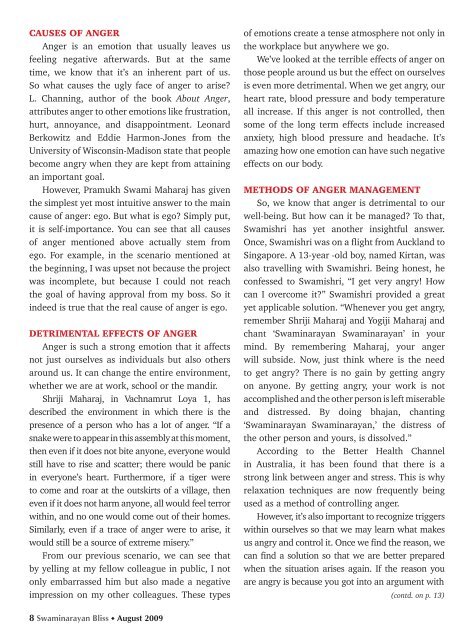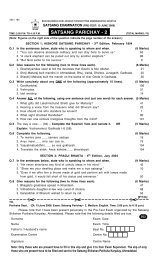August 2009 Annual Subscription Rs. 60 - Swaminarayan Sanstha
August 2009 Annual Subscription Rs. 60 - Swaminarayan Sanstha
August 2009 Annual Subscription Rs. 60 - Swaminarayan Sanstha
Create successful ePaper yourself
Turn your PDF publications into a flip-book with our unique Google optimized e-Paper software.
CAUSES OF ANGER<br />
Anger is an emotion that usually leaves us<br />
feeling negative afterwards. But at the same<br />
time, we know that it’s an inherent part of us.<br />
So what causes the ugly face of anger to arise?<br />
L. Channing, author of the book About Anger,<br />
attributes anger to other emotions like frustration,<br />
hurt, annoyance, and disappointment. Leonard<br />
Berkowitz and Eddie Harmon-Jones from the<br />
University of Wisconsin-Madison state that people<br />
become angry when they are kept from attaining<br />
an important goal.<br />
However, Pramukh Swami Maharaj has given<br />
the simplest yet most intuitive answer to the main<br />
cause of anger: ego. But what is ego? Simply put,<br />
it is self-importance. You can see that all causes<br />
of anger mentioned above actually stem from<br />
ego. For example, in the scenario mentioned at<br />
the beginning, I was upset not because the project<br />
was incomplete, but because I could not reach<br />
the goal of having approval from my boss. So it<br />
indeed is true that the real cause of anger is ego.<br />
DETRIMENTAL EFFECTS OF ANGER<br />
Anger is such a strong emotion that it affects<br />
not just ourselves as individuals but also others<br />
around us. It can change the entire environment,<br />
whether we are at work, school or the mandir.<br />
Shriji Maharaj, in Vachnamrut Loya 1, has<br />
described the environment in which there is the<br />
presence of a person who has a lot of anger. “If a<br />
snake were to appear in this assembly at this moment,<br />
then even if it does not bite anyone, everyone would<br />
still have to rise and scatter; there would be panic<br />
in everyone’s heart. Furthermore, if a tiger were<br />
to come and roar at the outskirts of a village, then<br />
even if it does not harm anyone, all would feel terror<br />
within, and no one would come out of their homes.<br />
Similarly, even if a trace of anger were to arise, it<br />
would still be a source of extreme misery.”<br />
From our previous scenario, we can see that<br />
by yelling at my fellow colleague in public, I not<br />
only embarrassed him but also made a negative<br />
impression on my other colleagues. These types<br />
of emotions create a tense atmosphere not only in<br />
the workplace but anywhere we go.<br />
We’ve looked at the terrible effects of anger on<br />
those people around us but the effect on ourselves<br />
is even more detrimental. When we get angry, our<br />
heart rate, blood pressure and body temperature<br />
all increase. If this anger is not controlled, then<br />
some of the long term effects include increased<br />
anxiety, high blood pressure and headache. It’s<br />
amazing how one emotion can have such negative<br />
effects on our body.<br />
METHODS OF ANGER MANAGEMENT<br />
So, we know that anger is detrimental to our<br />
well-being. But how can it be managed? To that,<br />
Swamishri has yet another insightful answer.<br />
Once, Swamishri was on a flight from Auckland to<br />
Singapore. A 13-year -old boy, named Kirtan, was<br />
also travelling with Swamishri. Being honest, he<br />
confessed to Swamishri, “I get very angry! How<br />
can I overcome it?” Swamishri provided a great<br />
yet applicable solution. “Whenever you get angry,<br />
remember Shriji Maharaj and Yogiji Maharaj and<br />
chant ‘<strong>Swaminarayan</strong> <strong>Swaminarayan</strong>’ in your<br />
mind. By remembering Maharaj, your anger<br />
will subside. Now, just think where is the need<br />
to get angry? There is no gain by getting angry<br />
on anyone. By getting angry, your work is not<br />
accomplished and the other person is left miserable<br />
and distressed. By doing bhajan, chanting<br />
‘<strong>Swaminarayan</strong> <strong>Swaminarayan</strong>,’ the distress of<br />
the other person and yours, is dissolved.”<br />
According to the Better Health Channel<br />
in Australia, it has been found that there is a<br />
strong link between anger and stress. This is why<br />
relaxation techniques are now frequently being<br />
used as a method of controlling anger.<br />
However, it’s also important to recognize triggers<br />
within ourselves so that we may learn what makes<br />
us angry and control it. Once we find the reason, we<br />
can find a solution so that we are better prepared<br />
when the situation arises again. If the reason you<br />
are angry is because you got into an argument with<br />
(contd. on p. 13)<br />
8 <strong>Swaminarayan</strong> Bliss <strong>August</strong> <strong>2009</strong>
















